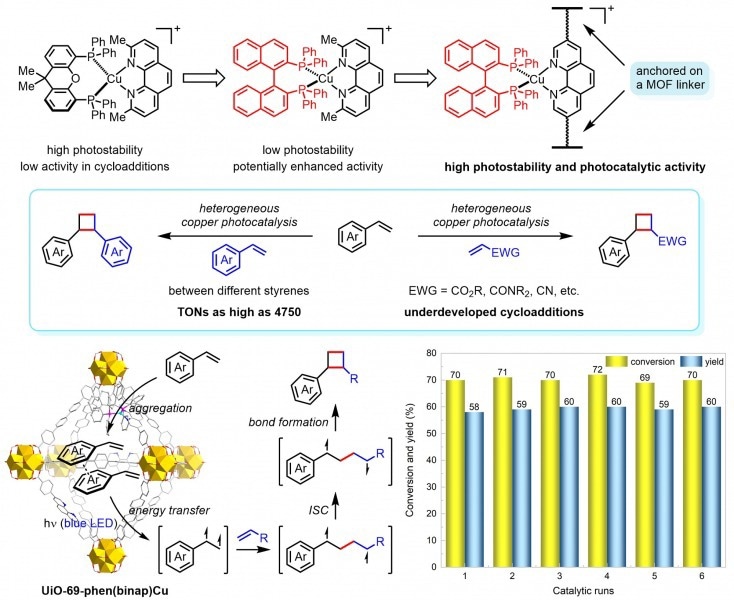
Development of heterogeneous copper photocatalysis for intermolecular crossed [2+2] cycloadditions. Image Credit: Adapted from Nature Catalysis
Pharmaceuticals, natural goods, and various physiologically active substances all contain cyclobutane rings. Professor Jian He and his colleagues have given researchers more control over synthesizing these essential compounds by enabling the rapid and selective creation of these rings. The research was published in Nature Catalysis.
During the last twenty years, photochemical [2+2] cycloadditions have been facilitated by visible-light photocatalysts; however, their range of substrates has been restricted. Homogenous precious metal catalysts are also a common component of existing photocatalytic systems, which makes recycling catalysts difficult and limits the possibility of large-scale organic synthesis.
To overcome these constraints, Professor He and his group have created a novel heterogeneous copper photocatalyst. For various intermolecular crossing [2+2] cycloadditions, including some previously unattainable by traditional homogeneous photocatalysis, this catalyst efficiently supports energy-transfer procedures.
This new reaction system is more environmentally and economically sustainable because it does not rely on precious metals and has outstanding catalyst stability and recyclability.
Our novel heterogeneous copper photocatalyst opens up new possibilities for synthesizing bioactive molecules with enhanced efficiency and selectivity. By eliminating the reliance on precious metals and improving catalyst recyclability, we have addressed critical challenges in large-scale organic synthesis, paving the way for more sustainable and economically viable chemical production.
Jian HE, Professor, Department of Chemistry, University of Hong Kong
Key Findings
The researchers in this work created a unique type of copper photocatalyst that can aid in the more effective synthesis of cyclobutane molecules. They could create binap-ligated heteroleptic copper(I) complexes in the pores of zirconium-based metal-organic frameworks (MOFs) and produce a stable heterogeneous copper triplet photosensitizer.
To improve catalytic efficiency in energy-transfer-mediated [2+2] cycloadditions of styrenes with a range of olefins, including electron-deficient alkenes, heterogenization of reactive copper(I) species in photoexcited states is necessary.
The MOF-supported copper photocatalyst has superior stability and catalytic activity compared to the corresponding homogeneous copper photocatalysts. It can also be recycled numerous times without catalyst degradation.
This study offers a generic and multidisciplinary method for creating highly reactive copper photocatalysts for a variety of realistic organic processes, and it could contribute to future improvements in the ease and productivity of producing a wide range of bioactive chemicals.
Journal Reference:
Guo, J., et al, (2024) Visible light-mediated intermolecular crossed [2+2] cycloadditions using a MOF-supported copper triplet photosensitizer. Nature Catalysis. doi.org/10.1038/s41929-024-01112-9